初中英语中考常用词汇词组短语用法区分(共24组)
中考英语_重要考点_短语_词组归纳(免费)

《中考英语重要考点,短语,词组归纳》【一】、短语、词组归纳:由动词开头构成的短语、词组很多。
复习时应分类处理:一、动词+介词1.look at…看…,look like … 看上去像……,look after …照料…2.listen to…听……3.welcome to…欢迎到……4.say hello to …向……问好5.speak to…对……说话此类短语相当于及物动词,其后必须带宾语,但宾语无论是名词还是代词,都要放在介词之后。
如:This is my new bike. Please look it after.(×)This is my new bike. Please look after it.(√)二、动词+副词“动词+副词”所构成的短语义分为两类:A.动词(vt.)+副词1.put on 穿上2.take off脱下3.write down记下此类短语可以带宾语,宾语若是名词,放在副词前后皆可;宾语若是人称代词,只能放在副词的前面。
试比较:First listen to the tape, then write down the answer/write the answer down. (√)First listen to the answer, then write down it.(×)First listen to the answer, then write it down.(√)B.动词(vi)+副词。
1.come on赶快2.get up起床3.go home回家4.come in进来5.sit down坐下6.stand up起立此类短语属于不及物动词,不可以带宾语。
三、其它类动词词组1.close the door2.1ook the same3.go to work/class4.be ill5.have a look/seat6.have supper7.1ook young8.go shopping9.watch TV/games10. play games【二】、介词短语聚焦“介词+名词/代词”所构成的短语称为介词短语。
中考英语重点单词和短语用法大总结

中考英语重点单词和短语用法大总结一.重点单词用法总结:1. succeed - v. 成功- succeed in + 动名词 / 名词 / doing sth. - 在事上成功2. access - n. 进入,接近- have access to + 名词 - 能够接触事物3. advantage - n. 优势- take advantage of - 利用/趁...之机4. aim - n. 目标, v. 瞄准,旨在- take aim at - 瞄准物5. avoid - v. 避免- avoid + 动名词 / doing sth. - 避免做事6. behavior - n. 行为- behavior towards / toward - 对待...的行为7. benefit - n. 利益, 有益于, v. 有益于- benefit from - 从...中受益8. celebrate - v. 庆祝- celebrate + 假日/事件 - 庆祝一些假日/事件9. challenge - n. 挑战, v. 向...挑战- rise to the challenge - 迎接挑战10. contribute - v. 贡献, 捐赠- contribute to - 对...有贡献11. deceive - v. 欺骗- deceive + sb. into + 动名词 / doing sth. - 欺骗人做事12. determine - v. 决定,确定- determine to + 动词原形 - 决定要做事13. encourage - v. 鼓励- encourage + 名词 - 鼓励人/物14. equal - adj. 相等的- be equal to - 相等于15. establish - v. 确立,建立- establish + 名词 - 建立事物16. experience - n. 经验, v. 经历- gain / acquire experience - 获得经验17. include - v. 包括- include + 名词 - 包括事物18. increase - v./n. 增加- increase + 名词 - 增加事物19. influence - n. 影响, v. 影响- have / exert influence on - 对...有/施加影响20. introduce - v. 介绍- introduce + 名词 - 介绍人/物21. involve - v. 涉及,包括- involve + 名词/动名词 - 涉及/包含事物22. maintain - v. 维持- maintain + 名词/形容词 - 维持事物23. modify - v. 修饰,修改- modify + 名词/形容词 - 修改事物24. object - n. 物体, v. 反对- object + to + 名词/动名词/动词-ing - 反对事物/做事25. occur - v. 发生- occur + 名词/动名词 - 发生事物二.重点短语用法总结:1. by accident - 偶然地- I met her by accident at the supermarket.2. at ease - 放松- Please make yourself at ease.3. in charge - 负责- He is in charge of the project.5. in fact - 事实上- He is not a doctor. In fact, he is a nurse.6. in order to - 为了- I wake up early in order to catch the bus.7. on purpose - 故意- He dropped the glass on purpose.8. up to - 高达, 至多9. with the help of - 在...的帮助下- She finished the project with the help of her friends.。
初中英语2024届中考复习常考易混单词和短语
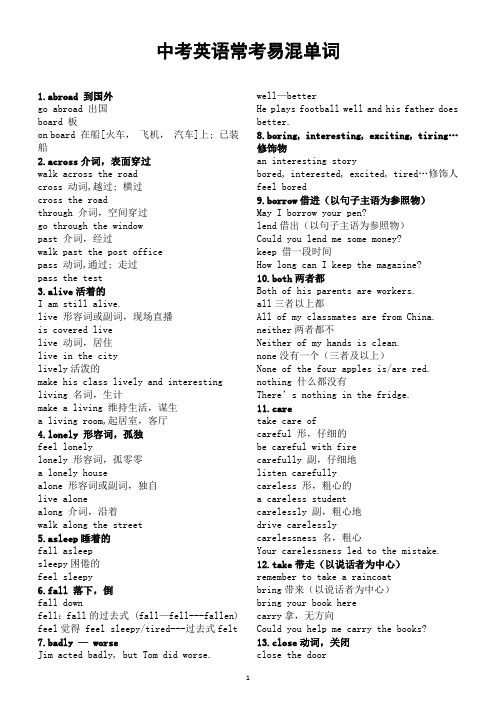
中考英语常考易混单词1.abroad 到国外go abroad 出国board 板on board 在船[火车,飞机,汽车]上; 已装船2.across介词,表面穿过walk across the roadcross 动词,越过; 横过cross the roadthrough 介词,空间穿过go through the windowpast 介词,经过walk past the post officepass 动词,通过; 走过pass the test3.alive活着的I am still alive.live 形容词或副词,现场直播is covered livelive 动词,居住live in the citylively活泼的make his class lively and interesting living 名词,生计make a living 维持生活,谋生a living room,起居室,客厅4.lonely 形容词,孤独feel lonelylonely 形容词,孤零零a lonely housealone 形容词或副词,独自live alonealong 介词,沿着walk along the street5.asleep睡着的fall asleepsleepy困倦的feel sleepy6.fall 落下,倒fall downfell:fall的过去式 (fall—fell---fallen) feel觉得 feel sleepy/tired---过去式felt 7.badly — worseJim acted badly, but Tom did worse. well—betterHe plays football well and his father does better.8.boring, interesting, exciting, tiring…修饰物an interesting storybored, interested, excited, tired…修饰人feel bored9.borrow借进(以句子主语为参照物)May I borrow your pen?lend借出(以句子主语为参照物)Could you lend me some money?keep 借一段时间How long can I keep the magazine?10.both两者都Both of his parents are workers.all三者以上都All of my classmates are from China. neither两者都不Neither of my hands is clean.none没有一个(三者及以上)None of the four apples is/are red. nothing 什么都没有There’s nothi ng in the fridge.11.caretake care ofcareful 形,仔细的be careful with firecarefully 副,仔细地listen carefullycareless 形,粗心的a careless studentcarelessly 副,粗心地drive carelesslycarelessness 名,粗心Your carelessness led to the mistake. 12.take带走(以说话者为中心)remember to take a raincoatbring带来(以说话者为中心)bring your book herecarry拿,无方向Could you help me carry the books?13.close动词,关闭close the doorclose 形容词,亲密的my closest friendclosed形,关着的keep the door closed14.closely副,密切地work closely with us15.brave形,勇敢的He is brave enough to save the old man. courage 名,勇气have the courage to tell him the bad news bravely 副,勇敢地face the difficulties bravely16.dead形容词,死的have been deaddie动,死亡die of hungerdeath名,死亡the death of his pet makes him so sad. 17.especially副,尤其He is good at all subjects, especially maths.specially副,专门The pen is specially designed for the boy. special形,特殊的a special day18.except除了All the students except Tom will go for a school trip.expect期待You are expected to bring it back when you return.19.excited形,激动的,修饰人feel excitedexciting形,激动人心的,修饰物an exciting filmexcitedly 副词,修饰动画shouted excitedlyexcitement名词shout with excitement20.a little一些,修饰不可数名词a little moneya few一些,修饰可数名词a few treeslittle几乎没有,修饰不可数名词There’s little water in the glass, is it? few几乎没有,修饰可数名词so few students21.form 形成form a good reading habitfrom 从……22.France法国/ French 法语German德国的/ Germany 德国23.hard努力work hardhardly几乎不The boy hardly does his homework.24.healthy健康的keep healthyhealth健康it’s good for your healthhealthily健康地eat healthily25.if如果主将从现If he comes, I’ll call you.是否I don’t know if he will come here. whether是否(如与or连用,则用)I wonder whether he’ll come or not. weather 天气What will the weather be like tomorrow?26.include 动词,包括The list includes the names of many famous writers.including 介词,包括They have many pets, including three cats.27.invent动词发明Edison invented a lot of things. invention名词发明The invention made much difference to humans.inventor名词发明者Edison was a great inventor.st 上一个的last year;最后的make her last apperance动词,持续The meeting will last one and a half hours. lasting 形,持久的a lasting value29.lie名词,谎言tell a lie动词,说谎He is always lying to us.动词,位于Japan lies to the east of China.动词,躺,平放He likes lying on the grass.躺,平放;位于:lie—lay---lain说谎:lie-lied-lied30.luck名,运气good lucklucky 形,幸运的a lucky numberluckily 副,幸运的是Luckily, we got better marks.unlucky/unluckily31.noise名,噪音Don’t make any noise.noisy 形,吵闹的much too noisynoisily 副,吵闹地talk noisily32.noise 名词,噪音sound 名词,声音We sat listening to the sound of the waves sound 动词,听起来The music sounds beautiful.voice 名词,嗓音The singer has a sweet voice.33.provide提供provide a chance for the boy=provide the boy with a chanceoffer 提供offer a chance to the boy=offer the boy a chance34.other别的,加名词other studentsanother另一个I don’t like the pair of shoes, would you like to show me another pair?the other 两个中的另一个,常用one…the otherHere is a shoe, where’s the other one? others= other+名词35.over/ under年龄的上下above/ below温度,楼层的上下36.peace名词,和平love peacepeaceful形,宁静的a peaceful villagepeacefully 副,和平地we hope to solve the problem peacefully.37.pleasure名,乐意。
初三重点英语单词句型及语法
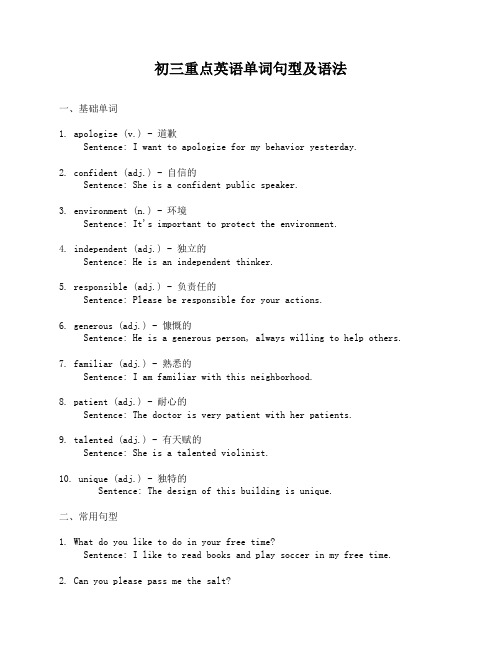
初三重点英语单词句型及语法一、基础单词1. apologize (v.) - 道歉Sentence: I want to apologize for my behavior yesterday.2. confident (adj.) - 自信的Sentence: She is a confident public speaker.3. environment (n.) - 环境Sentence: It's important to protect the environment.4. independent (adj.) - 独立的Sentence: He is an independent thinker.5. responsible (adj.) - 负责任的Sentence: Please be responsible for your actions.6. generous (adj.) - 慷慨的Sentence: He is a generous person, always willing to help others.7. familiar (adj.) - 熟悉的Sentence: I am familiar with this neighborhood.8. patient (adj.) - 耐心的Sentence: The doctor is very patient with her patients.9. talented (adj.) - 有天赋的Sentence: She is a talented violinist.10. unique (adj.) - 独特的Sentence: The design of this building is unique.二、常用句型1. What do you like to do in your free time?Sentence: I like to read books and play soccer in my free time.2. Can you please pass me the salt?Sentence: Sure, here you go.3. I'm sorry, but I can't attend the party tonight.Sentence: That's okay, maybe next time.4. How was your weekend?Sentence: My weekend was great, I went hiking with my family.5. Could you please help me with my homework?Sentence: Of course, I would be happy to help.6. What time does the movie start?Sentence: The movie starts at 7:30 PM.7. Where is the nearest bus stop?Sentence: The nearest bus stop is just around the corner.8. I'm really excited about the school trip next week.Sentence: Me too, it's going to be a lot of fun.9. What do you want to be when you grow up?Sentence: I want to be a doctor and help people.10. How do you spell your name?Sentence: My name is spelled J-O-H-N.三、语法1. Present Simple Tense (一般现在时)- 表示经常发生的动作或事实。
初中英语中考知识点大总结
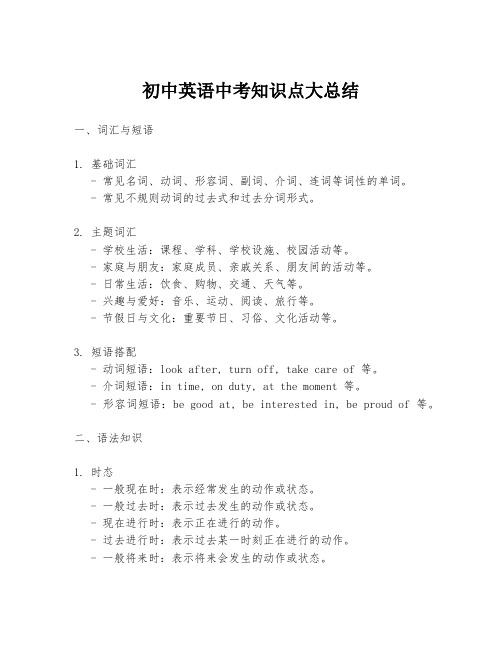
初中英语中考知识点大总结一、词汇与短语1. 基础词汇- 常见名词、动词、形容词、副词、介词、连词等词性的单词。
- 常见不规则动词的过去式和过去分词形式。
2. 主题词汇- 学校生活:课程、学科、学校设施、校园活动等。
- 家庭与朋友:家庭成员、亲戚关系、朋友间的活动等。
- 日常生活:饮食、购物、交通、天气等。
- 兴趣与爱好:音乐、运动、阅读、旅行等。
- 节假日与文化:重要节日、习俗、文化活动等。
3. 短语搭配- 动词短语:look after, turn off, take care of 等。
- 介词短语:in time, on duty, at the moment 等。
- 形容词短语:be good at, be interested in, be proud of 等。
二、语法知识1. 时态- 一般现在时:表示经常发生的动作或状态。
- 一般过去时:表示过去发生的动作或状态。
- 现在进行时:表示正在进行的动作。
- 过去进行时:表示过去某一时刻正在进行的动作。
- 一般将来时:表示将来会发生的动作或状态。
2. 语态- 被动语态:表示动作的承受者。
- 常见时态的被动语态形式。
3. 非谓语动词- 动名词:作为名词使用,表示动作。
- 分词:现在分词和过去分词,用作形容词或副词。
- 不定式:作为名词、形容词、副词等。
4. 情态动词- can/could, may/might, must, should/ought to 等。
- 表示可能性、建议、义务等。
5. 代词- 人称代词、物主代词、反身代词、指示代词、疑问代词等。
6. 连词- 并列连词:and, but, or, so 等。
- 从属连词:because, since, although, if, when 等。
7. 句子结构- 简单句、复合句、复杂句。
- 陈述句、疑问句、祈使句、感叹句。
8. 特殊句式- 倒装句:表示强调或条件。
- 省略句:在某些情况下可以省略句子的某些成分。
初中英语中考考点词汇精讲(共26个)

中考英语考点词汇精讲1.well&good两者都可以表示“好”的意思。
well是副词,用于修饰动词。
例如:Tom speaks Chinese well.汤姆的汉语说得好。
He sings well.他唱得好。
good是形容词,用作定语或表语。
例如:She is a good doctor.她是个好医生。
His pronunciation is very good.他的发音很好。
well作形容词时,指的是健康状况良好。
例如:He is quite well.他身体好。
I hope you will be well soon.我希望你很快好起来。
2.no&notno 表示“不”,修饰可数名词单数时no=not a; 修饰可数名词复数或者不可数名词时no=not any。
例如:I have no book.=I don’t have a book.I have no books.= I don’t have any books.There is no water in the cup.=There isn’t any water in the cup.no 常用来做否定回答,与yes相对应,not不可以。
例如:Do you like bananas? No, I don’t.不可以说Not, I don’t.not 用于否定句,放在助动词或者be动词后面表示否定,no 不可以。
例如:我们可以说I don’t like tea.不可以说I do no like tea.3.foodfood泛指“食物”,“食品”,通常用做不可数名词。
例如:I like Chinese food.我喜欢中国食品。
We should eat healthy food every day.我们每天应该吃健康食品。
food指食物的种类时是可数名词。
例如:Milk is a good food.牛奶是一种好食品。
Too many sweet foods, like cakes and pastry, may make you fat.太多的甜食,像蛋糕和点心,可能会使你发胖。
中考英语常用词组及用法解析#精选.

the other 指两个人或事物中的 “另一个 ”,表示特指。
如: W e 辨析集词、、 stood on one side of the road and they stood on the 等的考察,主要考、汇的辨o t h e r .站边站在那处。
析习用法的辨析。
another 侧重于不定数目中的 “此外一个 ”,表示泛 1. after, in 指,因此常用来指起码三其中的一个。
如: 这两个介词都能够表示 “⋯ ⋯时(间)此后 ”的意 She has taken another of my books. 她已经拿了我 思?after 以过去为起点,表示过去一段时间以后,常 的此外一本书。
用于过去时态的句子中 ?如: 5. spend, take, cost, pay She went after three days. 她是三天此后走的 ? i n s p e 一定是时态的句子中 ?如: She will go in three days. 她三天宾语。
如: 此后要走 ? She spent the whole evening in reading. 她把整个晚 2. how long, how often, how soon 上 h o w l o n g ,主要间 (如 t a k e 经常用来指 “花间,句子往常是表示 three days,four 事物的词语。
如: How long will this job take you? 你 weeks 等)发问?如: How long ago was it?这是多久 项工作要? 前的事了 ? c s t 指花或力气等,只好用表示事物的 h o w o f t e n 指每隔多久,主要频或状语 词,并且不可以用。
如: (如 once a H o w m u c h d o e s t h e j a c k e t c o s 克? week 等 )发问?如: — p a y 主要(某人某物 某事 )付(给 How often does he come here? — Once a month. 他 某人 )?如: I (每隔 )多久来一次 ?每个月一次 ? pay for my rooms by month. 我按月支付租金。
九年级英语短语归纳总结全册
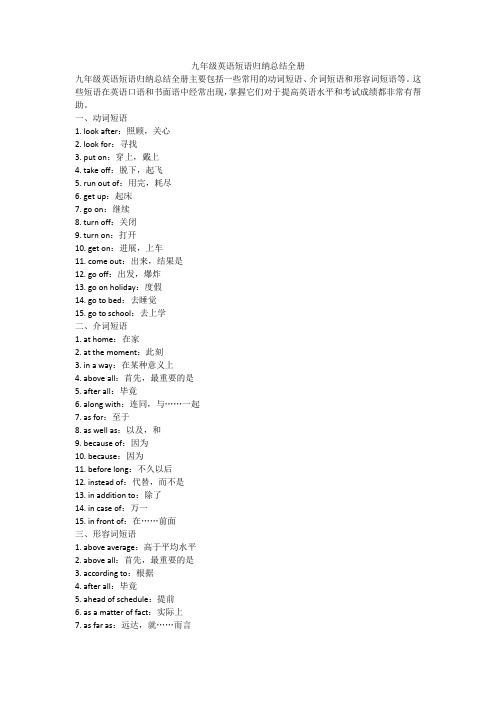
九年级英语短语归纳总结全册九年级英语短语归纳总结全册主要包括一些常用的动词短语、介词短语和形容词短语等。
这些短语在英语口语和书面语中经常出现,掌握它们对于提高英语水平和考试成绩都非常有帮助。
一、动词短语1. look after:照顾,关心2. look for:寻找3. put on:穿上,戴上4. take off:脱下,起飞5. run out of:用完,耗尽6. get up:起床7. go on:继续8. turn off:关闭9. turn on:打开10. get on:进展,上车11. come out:出来,结果是12. go off:出发,爆炸13. go on holiday:度假14. go to bed:去睡觉15. go to school:去上学二、介词短语1. at home:在家2. at the moment:此刻3. in a way:在某种意义上4. above all:首先,最重要的是5. after all:毕竟6. along with:连同,与……一起7. as for:至于8. as well as:以及,和9. because of:因为10. because:因为11. before long:不久以后12. instead of:代替,而不是13. in addition to:除了14. in case of:万一15. in front of:在……前面三、形容词短语1. above average:高于平均水平2. above all:首先,最重要的是3. according to:根据4. after all:毕竟5. ahead of schedule:提前6. as a matter of fact:实际上7. as far as:远达,就……而言8. as follows:如下9. as soon as:一……就10. as usual:像往常一样11. at most:最多12. at times:有时13. before long:不久以后14. both ... and ...:两者都15. but still:但仍然。
中考重点常见词汇和短语的用法
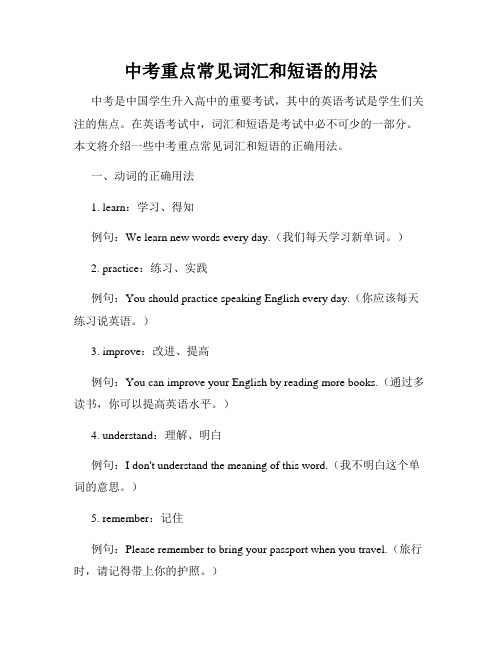
中考重点常见词汇和短语的用法中考是中国学生升入高中的重要考试,其中的英语考试是学生们关注的焦点。
在英语考试中,词汇和短语是考试中必不可少的一部分。
本文将介绍一些中考重点常见词汇和短语的正确用法。
一、动词的正确用法1. learn:学习、得知例句:We learn new words every day.(我们每天学习新单词。
)2. practice:练习、实践例句:You should practice speaking English every day.(你应该每天练习说英语。
)3. improve:改进、提高例句:You can improve your English by reading more books.(通过多读书,你可以提高英语水平。
)4. understand:理解、明白例句:I don't understand the meaning of this word.(我不明白这个单词的意思。
)5. remember:记住例句:Please remember to bring your passport when you travel.(旅行时,请记得带上你的护照。
)二、名词的正确用法1. exam:考试例句:I have an English exam tomorrow.(我明天有一场英语考试。
)2. grade:年级、分数例句:He is in the fifth grade.(他在五年级。
)3. subject:科目例句:Math is my favorite subject.(数学是我最喜欢的科目。
)4. book:书例句:I borrowed a book from the library.(我从图书馆借了本书。
)5. knowledge:知识例句:Reading can broaden our knowledge.(阅读可以扩大我们的知识面。
)三、形容词和副词的正确用法1. difficult:困难的例句:This math problem is difficult to solve.(这个数学问题很难解。
九年级英语必备单词短语
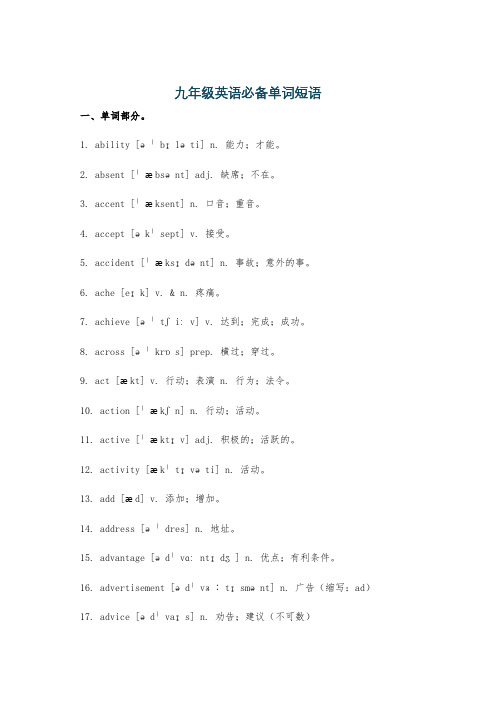
九年级英语必备单词短语一、单词部分。
1. ability [əˈbɪləti] n. 能力;才能。
2. absent [ˈæbsənt] adj. 缺席;不在。
3. accent [ˈæksent] n. 口音;重音。
4. accept [əkˈsept] v. 接受。
5. accident [ˈæksɪdənt] n. 事故;意外的事。
6. ache [eɪk] v. & n. 疼痛。
7. achieve [əˈtʃiːv] v. 达到;完成;成功。
8. across [əˈkrɒs] prep. 横过;穿过。
9. act [ækt] v. 行动;表演 n. 行为;法令。
10. action [ˈækʃn] n. 行动;活动。
11. active [ˈæktɪv] adj. 积极的;活跃的。
12. activity [ækˈtɪvəti] n. 活动。
13. add [æd] v. 添加;增加。
14. address [əˈdres] n. 地址。
15. advantage [ədˈvɑːntɪdʒ] n. 优点;有利条件。
16. advertisement [ədˈvɜːtɪsmənt] n. 广告(缩写:ad)17. advice [ədˈvaɪs] n. 劝告;建议(不可数)18. advise [ədˈvaɪz] v. 劝告;建议。
19. afford [əˈfɔːd] v. 买得起;担负得起。
20. afraid [əˈfreɪd] adj. 害怕的;担心的。
21. Africa [ˈæfrɪkə] n. 非洲。
22. African [ˈæfrɪkən] adj. 非洲的;非洲人的 n. 非洲人。
23. after [ˈɑːftə(r)] prep. & conj. 在……之后;adv. 以后;后来。
中考易混淆单词词组汇总
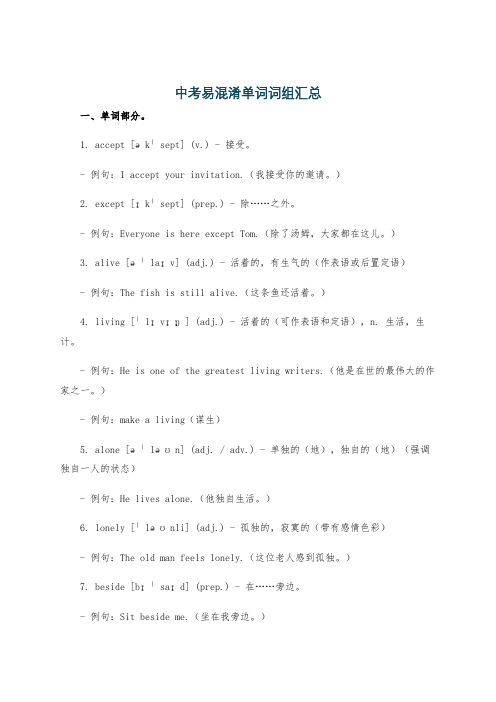
中考易混淆单词词组汇总一、单词部分。
1. accept [əkˈsept] (v.) - 接受。
- 例句:I accept your invitation.(我接受你的邀请。
)2. except [ɪkˈsept] (prep.) - 除……之外。
- 例句:Everyone is here except Tom.(除了汤姆,大家都在这儿。
)3. alive [əˈlaɪv] (adj.) - 活着的,有生气的(作表语或后置定语)- 例句:The fish is still alive.(这条鱼还活着。
)4. living [ˈlɪvɪŋ] (adj.) - 活着的(可作表语和定语),n. 生活,生计。
- 例句:He is one of the greatest living writers.(他是在世的最伟大的作家之一。
)- 例句:make a living(谋生)5. alone [əˈləʊn] (adj. / adv.) - 单独的(地),独自的(地)(强调独自一人的状态)- 例句:He lives alone.(他独自生活。
)6. lonely [ˈləʊnli] (adj.) - 孤独的,寂寞的(带有感情色彩)- 例句:The old man feels lonely.(这位老人感到孤独。
)7. beside [bɪˈsaɪd] (prep.) - 在……旁边。
- 例句:Sit beside me.(坐在我旁边。
)8. besides [bɪˈsaɪdz] (prep. / adv.) - 除……之外(还有),此外。
- 例句:Besides English, we also learn French.(除了英语,我们还学法语。
)- 例句:I don't like this dress. Besides, it's too expensive.(我不喜欢这条裙子。
它太贵了。
初中英语短语归纳整理(完整版)
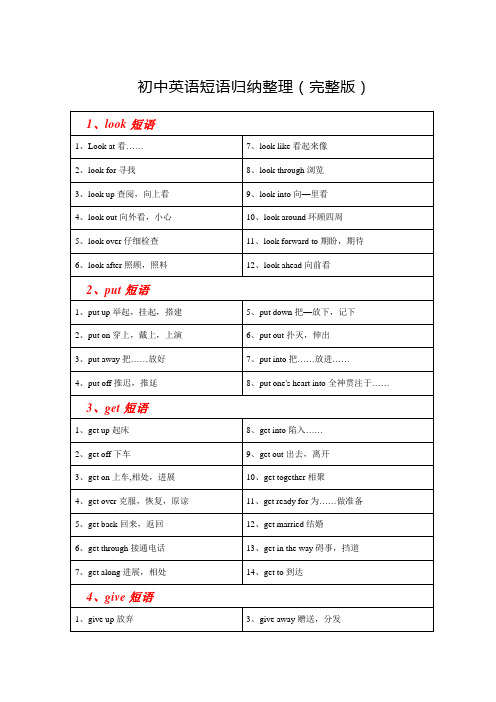
1、give up放弃
16、stand up起立,站起来
2、take up占据,占去,从事
17、make up编造,杜撰,构成,化妆
3、put up举起,挂起,张贴,搭建
18、think up想出,提出
4、set up建立,创立
19、cut up切碎
5、open up打开,开阔
20、pick up捡起,乘搭便车
初中英语短语归纳整理(完整版)
1、look短语
1、Look at看……
7、look like看起来像
2、look for寻找
8、look through浏览
3、look up查阅,向上看
9、look into向—里看
4、look out向外看,小心
10、look around环顾四周
5、look over仔细检查
26、decide on决定
12、on weekends在周末
27、concentrate on专心,专注
13、on the other hand另一方面
28、live on以……为生
14、on the left/right在左边/右边
29、spend on在……花费
15、on the phone用电话交谈,在通话
2、come true实现,达到
7、come in进来
3、come out出来,开放,出版
8、come along出现,发生,来到
4、come on加油,来吧
9、come from来自,产自
5、come back回来
10、come across遇见,(偶然)发现
11、on短语
1、on duty值日,值班
中考英语常用短语的区别与运用整理
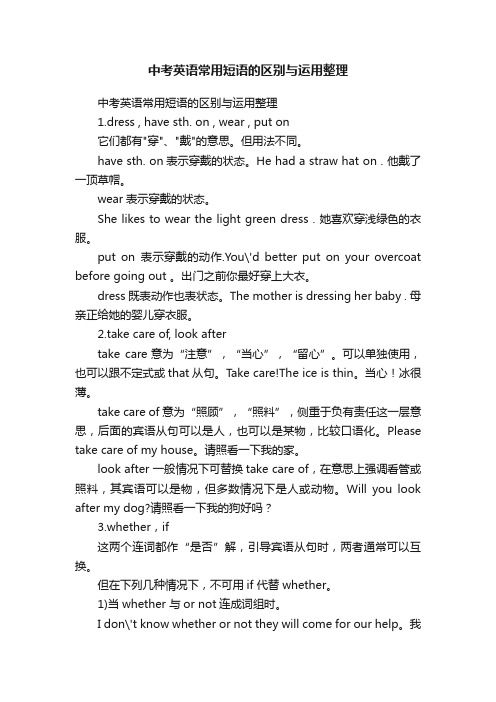
中考英语常用短语的区别与运用整理中考英语常用短语的区别与运用整理1.dress , have sth. on , wear , put on它们都有"穿"、"戴"的意思。
但用法不同。
have sth. on表示穿戴的状态。
He had a straw hat on . 他戴了一顶草帽。
wear表示穿戴的状态。
She likes to wear the light green dress . 她喜欢穿浅绿色的衣服。
put on表示穿戴的动作.You\'d better put on your overcoat before going out 。
出门之前你最好穿上大衣。
dress既表动作也表状态。
The mother is dressing her baby . 母亲正给她的婴儿穿衣服。
2.take care of, look aftertake care意为“注意”,“当心”,“留心”。
可以单独使用,也可以跟不定式或that从句。
Take care!The ice is thin。
当心!冰很薄。
take care of意为“照顾”,“照料”,侧重于负有责任这一层意思,后面的宾语从句可以是人,也可以是某物,比较口语化。
Please take care of my house。
请照看一下我的家。
look after 一般情况下可替换take care of,在意思上强调看管或照料,其宾语可以是物,但多数情况下是人或动物。
Will you look after my dog?请照看一下我的狗好吗?3.whether,if这两个连词都作“是否”解,引导宾语从句时,两者通常可以互换。
但在下列几种情况下,不可用if 代替whether。
1)当whether 与or not连成词组时。
I don\'t know whether or not they will come for our help。
初中英语重点短语考点辨析

初中英语重点短语考点辨析考点短语解析1. fill/ fullⅠ.fill为及物动词,表“使……满”,常与介词with搭配,表达“被……充满”时用be filled with结构。
如:① The bottle is filled with water. 这只瓶子装满了水。
② He was filled with joy at the news. 听到这个消息,他内心充满了喜悦。
Ⅱ.full是形容词,多作表语,表示主语所处的状态,常见于be full of 结构中。
如:① The schoolbag is full of books. 书包里装满了书。
② He drew in an old badsket full of sand.他捞上来一个灌满泥沙的旧蓝子。
[注]:be filled with = be full of .可以互换。
但介词with与of 不能混淆。
如:The room is full of people. = The room is filled with people.2. final/ lastⅠ.final表终止或结束之意,有时带有决定性或结论性等意味。
如:① Today is the final day of this term. 今天是本学期的最后一天。
② We shall know the final results of the elections tomorrow. 明天我们将知道选举的最后结果。
Ⅱ.last “最后的、末尾的”指按次序的前后或时间的先后居于最后,并意味着后面不再有了。
如:① My house stands in the last row.② He was the last one to enter.3. finally/ at last/ in the end这三个都可以作“最后”讲,但用法不同。
Ⅰ.finally表动作的发生顺序是在“最后”,无感情色彩,只用于过去时,它居句首时较多。
中考英语必备词汇——短语以及词组
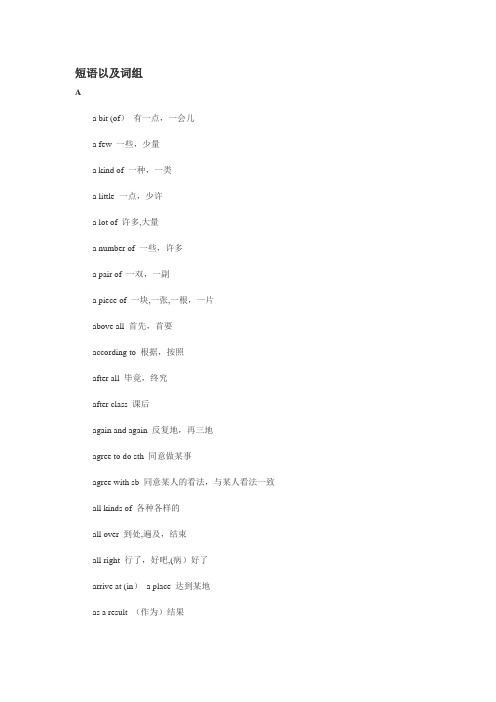
短语以及词组Aa bit (of)有一点,一会儿a few 一些,少量a kind of 一种,一类a little 一点,少许a lot of 许多,大量a number of 一些,许多a pair of 一双,一副a piece of 一块,一张,一根,一片above all 首先,首要according to 根据,按照after all 毕竟,终究after class 课后again and again 反复地,再三地agree to do sth 同意做某事agree with sb 同意某人的看法,与某人看法一致all kinds of 各种各样的all over 到处,遍及,结束all right 行了,好吧,(病)好了arrive at (in) a place 达到某地as a result (作为)结果as far as (表示程度,范围)就…尽…as if 好像,仿佛as long as 只要as soon as 一……就……as usual 通常,平常地as well 也,还有as well as 除…之外as…as 像,如同Bbe proud of 骄傲,自豪be strict with 对…严格要求belong to 属于both… and 两个都,既… 又…break down 损坏,(把化合物等)分解,(汽车)抛锚break in 闯入,强行进入,插嘴,打断break out (战争、火灾等)突然发生,爆发bring up 教育,培养build up 逐步建立by accident 偶然by air (bus, train, ship) 乘飞机(公共汽车,火车,轮船)by day 日间,在白天by the way 顺便说Ccall in 召集call on 拜访,访问call up 号召,打电话care for 喜欢,照顾(病人)carry on 继续下去,继续开展carry out 开展,执行catch up with 赶上(或超过)change into 转换成,把…变成check in 报到,登记check out 查明,结帐clear up 整理,收拾,(天气)放晴come across (偶然)遇见(或发现)come back 回来,想起来come down 落,下来come from 出生(于),来自come in 进入,进来come on 来吧,赶快come out 出来,(书等)出版,发行come to 共计,达到come true 变为现实,成为事实come up with 追上,赶上,想出(主意),找出(答案)come up 上来,上升,抬头compare to 与…相比compare with 与…相比congratulate… on 祝贺…connect with 与…相连cut down 砍倒cut off 切断Dday and night 日日夜夜deal with 处理,对付depend on (upon)依靠,相信,信赖die out 消失,灭亡different from 与…不同divide…into… 把…分成…do one’s best 尽最大的努力do some cleaning(shopping)做扫除(买东西)Eeach other 相互earn one’s living 谋生either… or 或者…或者…enjoy oneself 过得愉快even if 即使,尽管even though 即使,尽管ever since 自那时起直到现在Fface to face 面对面fall asleep 入睡fall ill 患病,病倒far away 遥远的far from 远离feel like doing 想要…,感觉要…fill… with 用…填充fill in 填充find out 查明,发现,了解first of all 首先for ever 永远for example 例如from now on 从今以后,今后from then on 从那时起from time to time 不时,偶尔from …to… 从…到…Gget along with 与…相处get away 逃,远离get back 返回,回来,回家get close(to) 接近get down 降下get in 进入,收获,达到get off 脱下(衣服等),下车get on with sb。
中考英语必背的分类短语,初一初二初三必看
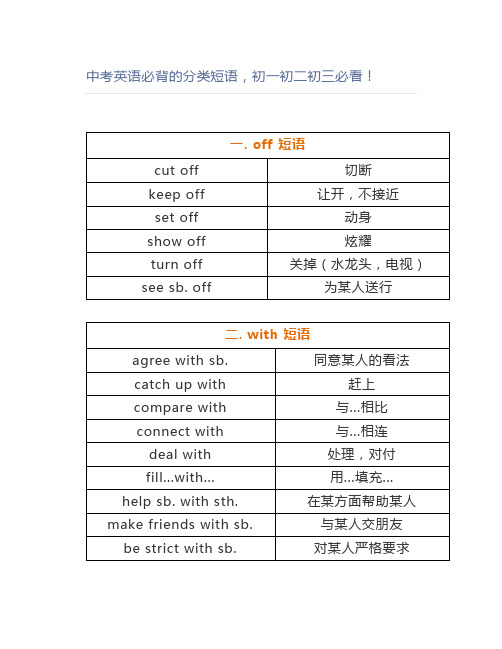
separate...from
将...与...分开
stop sb. from doing sth.
阻止某人做某事
far from
远离
be different from
与...不同
from time to time
不时,偶尔
from...to...
从...到...
十. down短语
cut down
出去,熄灭
go over
仔细检查,复习
go through
浏览,翻阅
二十二. look短语
look after
照顾
look ahead
向前看,展望未来
look down upon
看不起,轻视
look for
寻找
look forward to
盼望
look into
向...里面看,调查
look out
留神,当心
come up
走近,发生
二十. get短语
get up
起床
get away
逃脱,离开
get back
返回,回家
get down
下降
get in
进入,收获
get off
下车
get on
上车
get through
通过,拨通
get along with
与...相处
get close to
接近
get together
on duty
值日,值班
on foot
走路,步行
on show
展出,在上演
on time
准时
on the radio
初中英语中考全部知识点(词组、单词、句型)

初中英语知识点归纳冠词: the book beside my baga ‘u” and an ‘f” stay in hospitala university an umbrella play chessplay the piano by bus代词: a friend of mine a pho to of my mother’syour room is bigger than ours belong to mehelp yourselves to teach themselves辨析: sound voice noise noisylook (at ) see sb. do/ doing / watch sb. do listen (to) hear sb. do/ doingbring take carryhave been to have been in have gone to arrive (at/ in ) get to reachSb. spend time/ money on / doing It take sb. time to doSth. cost sb money sth. cost much/ littleSb pay money for sth sb. can’t afford sth. / to do ... the price is high/ low It is +adj + for/ of sb. to domake/ let/ have sb do ----- be made to doask/ advise/ tell/order/ warn sb. not to doused to do be used to do/ be used as sth, be used to doing hard harder hardlythe+比较, the + 比较级as+原级+ as/ not so/ as …. Asan eight-minute walk/ eight minutes’ walknine hundred/ hundreds ofa number of = a lot of = plenty of the number of There are sb. doing d evote… to doing look forward to doing Prefer(red) doing to doing prefer A to B prefer to dowould rather do than doWhy not do why don’t you do what about doingLet’s do… shall we? let us do … will you ?Would you like to do? would you please do? do you feel like doing? Do you like doing?none nothing allboth neither eithereach everyOther others another the otherthe others some .... others ....宾语从句: don’t know how to do it/ what to do= what I should doWhether or not what happened to youto in on the north ofexcept besideswomen doctors Children’s Day Mother’s Daysheep shelves thievespeople person humanthe Greens the Class C are having a meetingPut on 衣wear衣dress sb. dress up asput away put outtake off put off put up pick up something anything not everythingSorry : That’s OK It’s all right never mind It doesn’t matter It’s nothing Thank you : It’s a / pleasure. That’s OK That’s all right. You are welcome Do you mind my doing?finish doing practise doingShould be taken good care ofTrees are planted the pen writes wellneed sth need to do need doing= to be donen eedn’t do mustn’t do can’t domay may be maybewish hopeadj+ enough enough+ na bit a little mucha few/ few too much much tooadv 修饰实义动词系动词+ adjtrue/ truly/ truthWednesdayadvice suggestionill sickcure treatoperate on patients impatientprotect the environment importance arrival deaf blind homeless elderly generous perfect excellent wonderfulexcited excitingpleased pleasure pleasantcreate creative producevisitor inventorthe book written by sb. the film directed by sb.sth. sells well. Sth. sounds good sb. looks well dishonest incomplete carelessly endlessfrom…to between… andbelow under over aboveabroad foreign,pilot spaceman/ astronaut,cook cooker,science scientistaffect effect effortappear disappearcrowd crowdedcomplain complaintwelcome popularpunish punishmentagain againstalong aloneargue quarrelamong betweenbleed bloodborrow lendbreath breathecamel camera cabbage carrotcause because,choose choicechange chanceclose closed opencollect correct connectcollege universitycomplain comparecross across through though crossroads direct director directiondie death dead dying, courage encourageenemy friend friendlyenter entrance exitexperience experienced experimentfail fair unfair farther furtherfear afraid,feather leathergiraffe goldfish kangaroo rabbit tortoise height weight lengthhistory geographyhumor humorouslibrary lightning thunderlose lossmedal metal model modern, population pollutionpride proudprovide offersafety safesearch researchstomach stomachsteam termthirty thirstytoothbrush toothache,in front of in the front ofmonkeys the key to the questionone of ninth, twelfth, second, one fourth, three fifthsin his forties in the 1980sso that in order to as a resultso... that... such... that......quiet quite ratheranother two two moretest examdecide decisionwildly widelysuccess succeed successfulsoon fast quickly可延续动词的用法感叹句被动语态宾语从句时态节假日的日期英语作文指导1、环保 1. It's our duty to protect our environment. 2. We should not throw litter onto the ground 3. We should use cloth bags or baskets instead of using plastic bags. 4. We should not spit in a public place/ cut down the trees 5. We should plant more flowers and trees. 6. We must pick up some rubbish and throw it into a dustbin7. If everyone makes a contribution to protecting the environment, the world will become much more beautiful. 8. People can go to walk by bike instead of driving their cars there.2、旅游 1. Last Sunday (Saturday,…) ,it was sunny(rainy, windy, foggy,) 2. I got up very early (late). After breakfast I went to …with my friends by bike, bus,… 3. We enjoyed ourselves. 4. We forgot the time. We didn't come back until 5 o'clock. 5. We all felt very tired, but we were happy. 6. I think I will never forget this trip.7. Last summer, my parents and I went to Beijing for our holiday.8. We visited a lot of places of interest.9. We had a good time there.10. We bought a lot of things. The clothes there are good and cheap.3、健康 1. It is very important to keep healthy. 2. We can neither stay up too late nor get up too late. 3. We should eat healthily. 4. Taking exercise regularly is good for our health.4、节日 1. In China the most important holiday is the Spring Festival. 2. It comes in January or February. 3. On the New Year’s Eve people have a big dinner. They have a lot of nice food to eat. 4. During the Spring Festival people have a lot of interesting things to do. 5. People visit their relatives and friends. 6. They greet each other with a hug and say, "Happy New Year".7. As China is a big country, people in different places celebrate this holiday in different ways.5、写人 1. He was born in London in 1982. 2. He is 1.68 meters tall and weighs 52 kilos. 3. He is 20 years old. 4. He is a good tennis player. 5. He is outgoing. Every one likes to talk with him. He gets on well with us. 6. He teaches English very well.7. He works very hard.8. He often helps me with my English.9. It’s generous o f him to share his things with others.6、写城市 1. Nanjing lies in the east of ..., 2. It is a city with a long history. 3. People in ... are kind and hardworking. 4. There are many places of interest in it.交际用语参考《口语》书前面功能意念项目表词汇分类参考《中指》后面词汇表。
- 1、下载文档前请自行甄别文档内容的完整性,平台不提供额外的编辑、内容补充、找答案等附加服务。
- 2、"仅部分预览"的文档,不可在线预览部分如存在完整性等问题,可反馈申请退款(可完整预览的文档不适用该条件!)。
- 3、如文档侵犯您的权益,请联系客服反馈,我们会尽快为您处理(人工客服工作时间:9:00-18:30)。
中考英语常用词汇词组短语用法区分1.look(看起来)& look like(看起来像)【例】He looks awful.他看起来很糟糕.What does he look like?他长什么样子?He looks like his brother.他和他哥哥长得很像.2.not any与no:一句否定句里, not+any=肯定句+no.【例】我没(任何)钱.I don't have any money.(否定句用 not+any)=I have no money(肯定句用 no)我没有问题了.I don't have any questions.=I have no question.3.表示「休息」:rest/break/nap① rest( v./n. )休息时间可长可短,比如休息一个月/休息两小时,都可以.【例】I need to rest(v.)/ I need to have a rest(n.)② break (n.)休息时间很短, 15-20分钟.break本身有“断了”“折断”的意思, 在表示「时间」里通常有被打断的感觉. 【例】我得休息一会儿.I need to have a break(n.)③ nap (n.)午睡,小睡一会【例】我需要小睡一下.I need to have a nap(n.)4.示「帮助」:help=do sb a favor.help属于普通、平常的「帮」do sb a favor - favor有「好处, 好事」的意思.因此, do sb a favor是对自己来说, 这个帮助是对sb有好处的.一般说do me a favor比较好, 如果说do you a favor, 显得有点显摆、得意之感. 【例】你能帮我吗?Could you help me?Could you do me a favor?(这个帮助对me有好处的)5.睡觉:sleep/fall asleepfall asleep -进入睡着的状态sleep(动词)睡觉(你可以12点睡觉,但睡着可能凌晨1点)【例】我昨晚12点就睡了, 但1点才睡着.I went to sleep at 12 last night, but I fell asleep at 1.6.in time及时/on time准时比如:约7点见面.in time及时, 指在7点之内就到了, 可能还不到7点就到了.on time准时/按时, on是在...上面, 如果正好在7点上, 等于正好7点准时到.7.征求... ask for....ask sb for permission向某某请求同意ask for sb's permission请求某某的同意2种都可以用8.洗澡:shower/bathtake a shower(淋浴 ,花洒的洗澡)have a bath(泡澡 ,带浴缸的)bath tub浴缸9.工作:job/workjob-工作的名词,找了一份/两份工作work-工作的内容【例】我找到了2份工作.I found two jobs.我的工作没做完.I didn't finish my work.10.想要/需要:want/needwant和need的用法相同, 后面都可以:+to do+sb to do+n.(名词)+to+be+形容词(a.)【例】我需要你的帮助.+n.(名词)I need/want your help.(help在这里是名词)我想要洗澡I need a shower.(+名词)I need to take a shower(+to do)我需要你帮我.+sb to doI need/want you to help me.(help在这里是动词)我想让你开心I want you to be happy.(+形容词)-happy是形容词,前面加be,to后面要加动词,be是系动词,也属于动词的一种综上,有动词+do没有动词:用名词/形容词/介词短语/副词/done,且这些词前面一定要+be动词11.表示「担心」:worried(a.)-状态worry(v.)-动作【例】我不想让你担心.I don't want you to be worried.-句中没有动词,worried是形容词, 前面要加be(只要没有动词,就要+be动词)我真的很担心你.I really worry about you.(worry-动词)12.想要/需要:need/have to口语中都可以表示“得.../不得不.../不用.../不需要.../不必...”我得把作业做了I need/have to finish my homework.(+to do)你得休息了.You need a rest.(+n.)You need/have to rest.(+to do)你不用/不必关心我.You don't have to care about me.13.want/be going to do① want想(要),表示意愿和欲望,都是脑子里的想法,实际上会不会去做未知② be going to do要,准备,打算,表示主语/说话人的计划,基本上要实施(实际生活中,要结合实际情景运用)14.最好...had better (not) do sth.【例】你最好去看医生.You had better go to see a doctor.(也可略写成 You’d better...)15.有...要....have sth to do【例】我有很多作业要做.I have a lot of homework to do.我没钱看电影.I don't have money to watch movie.16.already(已经)&yet(还)① already&yet都是副词(adv.), 在现在完成时中, 可加可不加.-如果加上, 有点儿”锦上添花“的意思.-如果不加, 对「现在完成时强调动作已完成」也不影响.「现在完成时」回顾 :【笔记】0基础入门英语语法 | 时态:现在完成时&一般过去时, 怎么区分?【例】他已经写完作业了.He has finished homework.He has finished homework already.(两句话意思相同)② already用于肯定句, yet多用于否定句/疑问句.【例】他已经写完作业了.He has finished homework already.他还没写完作业.He hasn't finished homework yet.③如果不使用现在完成时(不强调动作已完成), 句中用already&yet, 则表示已经处于某种状态.【例】我已经在路上了.I'm already on the way.他还不是个老师.He is not a teacher yet.(事情还没发生)综上:-句中有动作, 且强调动作已完成, 用现在完成时, 表示「已经/还」, already/yet可加可不加.-句中没有动作, 不强调动作完成, 不用现在完成时, 只强调已经处于某种状态, 要加already/yet.17.表示「还...」:yet&still① yet用于否定句/疑问句, 通常翻译为:还没...② still用于肯定句, 通常翻译为:仍然.../还...【例】他们仍然(还)记得那天.They still remember that day.我还没回家.I'm not home yet.18.表示「再...」again & any more① again用于肯定句/否定句② any more用于否定句/疑问句, 通常翻译为:再也不.../不再....③ again表示「再一次...」,any more既可以表示「程度」,又可以表示「次数」【例】我再也不吃糖了.I will not eat candy again/any more.我再也不会输了.I won't lose again.(下一次不会再输)I won't lose any more.(不会输)非谓语动词做名词(宾语)I(主) like(谓) making friends(宾).I finish doing my homework.(关于「非谓语动词」, 咱后边还会专门讲, 敬请关注~)19.表示「擅长...」be good at doing sth- good是形容词, be good是「系表」结构, 如果前面加上主语, 则结构完整, 后面可以加adv./介词短语.- at是介词, 后面不可能再用动词, 所以doing是把动词加上ing变成名词, 在这里与前面的介词共同构成介词短语.- 用法延伸:be good表示「XXX很好」, good也可以替换成其它表示”好“的形容词:great/fantastic...↓be good/great/fantastic...+at doing sth.20.使动词用法&make两者都有“让某人....”的意思, 区别在于:① make后面只能加使动词的形容词(a.)形式, 构成「主谓宾+宾补」的结构②使动词本身就有“让某人....”的意思综上:make sb +a.(主谓宾宾补)让...disappoint(使动词) sb让...失望=make sb disappointed(a.)=let sb down【例】我不想让你失望.I don't want to disappoint you.I don't want to make you disaapointed.I don't want to let you down.「使动词」相关知识点回顾 :【笔记】英语语法入门到精通(19)| 动词之:使动词(用法&归纳)21.表示「选择」:choice (n.), 复数形式:choiceschoose (v.)【例】菜单上有很多选择, 但我的选择是汉堡 .The menu had a lot of options, but my choice was the burger.我必须在今晚去健身房还是去看电影之间做选择.I have to choose between going to the gym or watching a movie tonight.22.表示「听到/听说」hear(vt)听到, 直接加人/物,都是可以发出声音的hear(vi) +介词of/about-听说【例】我能听到窗外的鸟叫.I can hear(vt.) the birds chirping outside my window.-hear后面直接跟鸟bird, 是可以发声的.我以前从未听说过那个餐厅.I've never heard of that restaurant before.你听说过市中心刚刚开业的新店吗?Have you heard about the new store that just opened downtown?-hear是不及物动词(vi),后面必须加介词, 表示“听说...”23.pick sb up捡起来, 接某人【例】我的朋友下班后要来接我.My friend is going to pick me up after work.24.表示「同意」① agree to 暗示了决定做某事的意愿是由别人提出或请求的, 有被迫同意的意味② agree with 同意某人的观点,它意味着一个人的观点与另一个人的观点是一致的③ agree on 意为与别人达成协议或共同决定。
